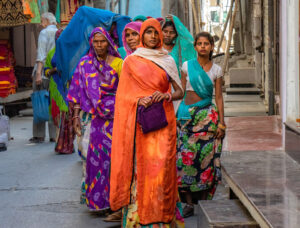
Origins of the WPS agenda: a narrow beginning
November 25th, the International Day for the Elimination of Violence Against Women, is an opportunity to reflect upon the United Nations’ most ambitious and comprehensive initiative to respect, protect and promote women’s rights in the last couple of decades: its Women, Peace and Security agenda.
Since its groundbreaking Resolution 1325 of 2000, the UN Security Council has adopted a series of ten more decisions, which together comprise the UN agenda on Women, Peace and Security (WPS). Notably, the occasion of the adoption of UNSCR 1325 was the first time since its establishment that the Security Council had devoted a whole session (in fact, it designated two full days) specifically to discuss women’s issues. During that session it recognized, for the first time, the gender-related harms and sufferings uniquely impacting women as victims of armed conflicts; but at the same time it also underscored the importance of women being agents of peace and security, and the critical importance of gender-mainstreaming in all political and diplomatic work. Hence, the WPS agenda should not be perceived as just another expression of women’s vulnerability, presenting them as victims. In fact, the significance of this agenda may very well lie in the way it captures both these contradictory aspects in women’s experiences of wars and armed conflicts. It lays the claim for women to have an equal seat at the table in every facet of negotiations and peace building efforts, among other factors because of their being disproportionately harmed and victimized by conflicts.
The WPS’s agenda was narrow at first: it called upon States to protect women and girls from gender-based violence in armed conflict. In a subsequent resolution it demanded the complete ‘cessation by all parties to armed conflict of all acts of sexual violence’. It acknowledged the fact that armed conflict entail distinct consequences for women, that women are exposed to unique suffering and distress, and that they have special needs – all of which had never been specifically dealt with or accounted for before. Women have seldom taken part in policymaking, nor in deciding on the initiation of an armed conflict. Similarly, they have generally not been among those attempting the resolution of a conflict. And this is where the Security Council entered: in addressing these very stages of conflict resolution and peace-building.
Broadening the scope of the WPS agenda
The WPS agenda is in fact a realization of the very basic human right to autonomy, which means the ability to control one’s life. A critical element of this is women’s right to representation and participation, to guarantee their right to decide upon their own fate. Thus, the narrow beginning of the WPS agenda has turned into an all-encompassing commitment to secure women’s presence in every policymaking and decision-making venue, across all aspects of life. The slogan “women’s rights are human rights” thus received substantive meaning and content. The realization that gender-mainstreaming should become part of the agenda of WPS and a necessary tool to broaden the awareness for gender equality among decision makers in the public and private spheres is a key element in reaching a generational change and a real transformation on the ground.
One can no longer claim that ‘security’ concerns only relate to situations of war and armed conflict.
Embedded in the UNSCR 1325 language is a broader understanding of the concept of ‘security’, which has become particularly poignant during the COVID crisis. One can no longer claim that ‘security’ concerns only relate to situations of war and armed conflict. The shadow pandemic of alarming increase in violence against women has impacted women everywhere. Furthermore, the lack of gender equality undermines the security not only of the women themselves but also of their families, communities, and nations at large.
Lessons learnt from Covid-19
The Covid-19 pandemic proved that ‘security’ means all aspects of human existence, including physical and mental health, nutrition subsistence, occupational security and, considering the looming climate crisis, actual physical sustainability. And just like with the narrow perception of conflict-related security concerns, women (as well as minorities and the poor) were disproportionately affected by the pandemic. But the pandemic has also brought forth another crucial truth: it has shown that it is imperative fully to include women in leadership and in decision-making positions. In a way, it created a real-time experiment which allowed us to compare similarly situated states led by women to those led by men. This comparison leaves no doubt: female leadership proved to be better suited in handling this crisis. Already at an early stage in the pandemic, data showed that while women comprised only some 11% of political leaders globally, they have accounted for an estimated 40 percent of the most successful responses to COVID.
It is not just the female leadership, it is the specific style of leadership that these leaders adopted: one that respects scientific expertise, that encourages collaboration and transparency, that expresses empathy, takes responsibility, and admits mistakes. All these are not necessarily inherently female traits. However, as much as they can be displayed by both women and men leaders, they have shown to be more associated with women than with men. Melinda Gates accurately concluded that “[t]his is how we can emerge from the pandemic in all of its dimensions: by recognizing that women are not just victims of a broken world; they can be architects of a better one”. This is exactly what the WPS agenda aims at.
The WPS agenda: forward looking
The WPS agenda has had considerable presence within the framework of international human rights law, particularly in the work of the Committee on the Elimination of all forms of Discrimination Against Women (CEDAW). In its ongoing dialogues with States parties reporting on the implementation of the Convention on the Elimination of all forms of Discrimination Against Women, CEDAW has drawn upon the WPS agenda in emphasizing the importance of women’s participation in peace processes as a significant factor in ending violence against women in armed conflict. In 2013, CEDAW adopted General Recommendation 30 on Women in Conflict Prevention, Conflict And Post-Conflict Situations. The General Recommendation serves as an authoritative guidance to countries that have ratified the Convention on concrete measures to ensure women’s human rights are protected before, during and after conflict. More importantly, it has given a normative basis to the Security Council Resolutions 1325 and the whole WPS agenda.
At a time which many would rightly view the current moment as signifying backsliding in terms of women’s rights and gender equality, it is important to recall the advances that were made not that long ago. We must reclaim their potential and attempt to overcome those forces that would take us back to a past where women were marginalized, and the world suffered as a result.


